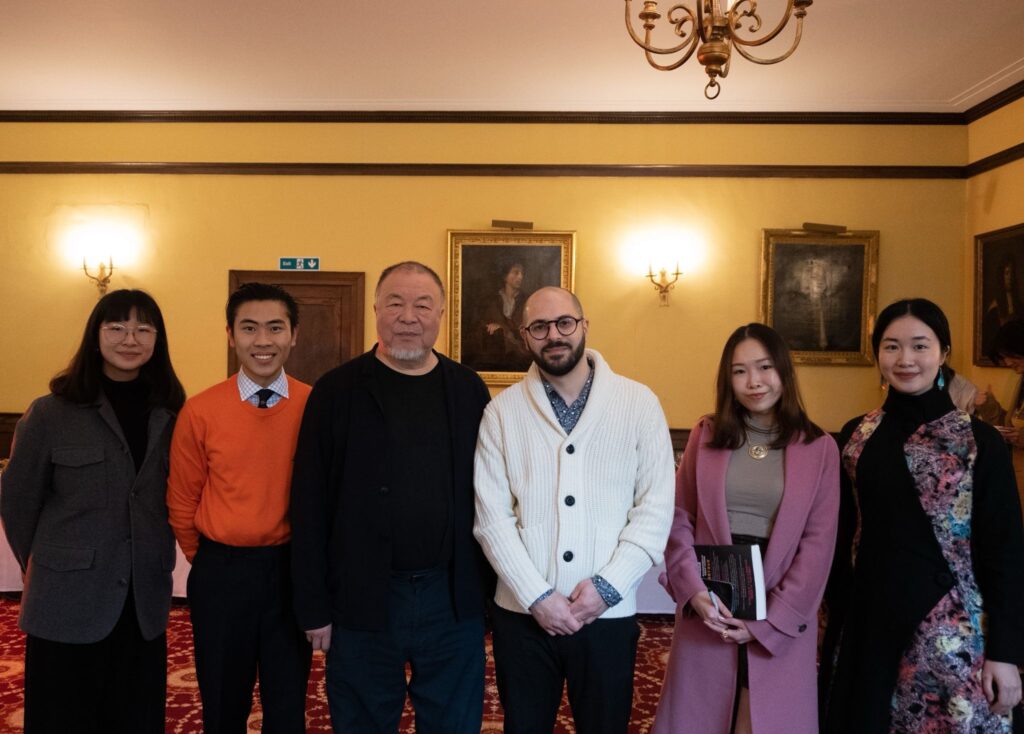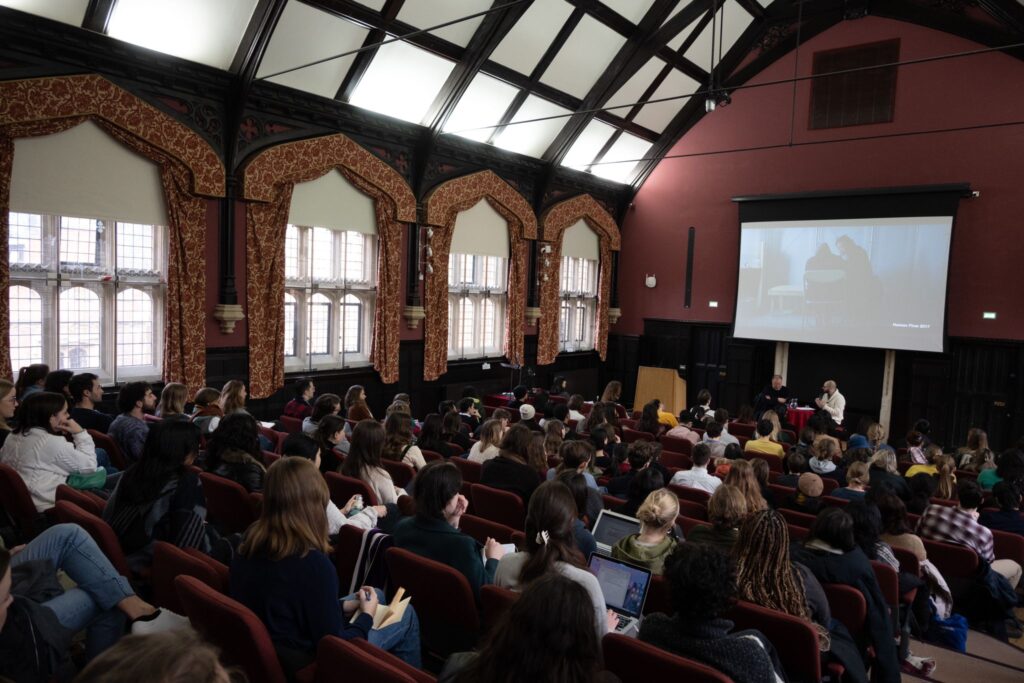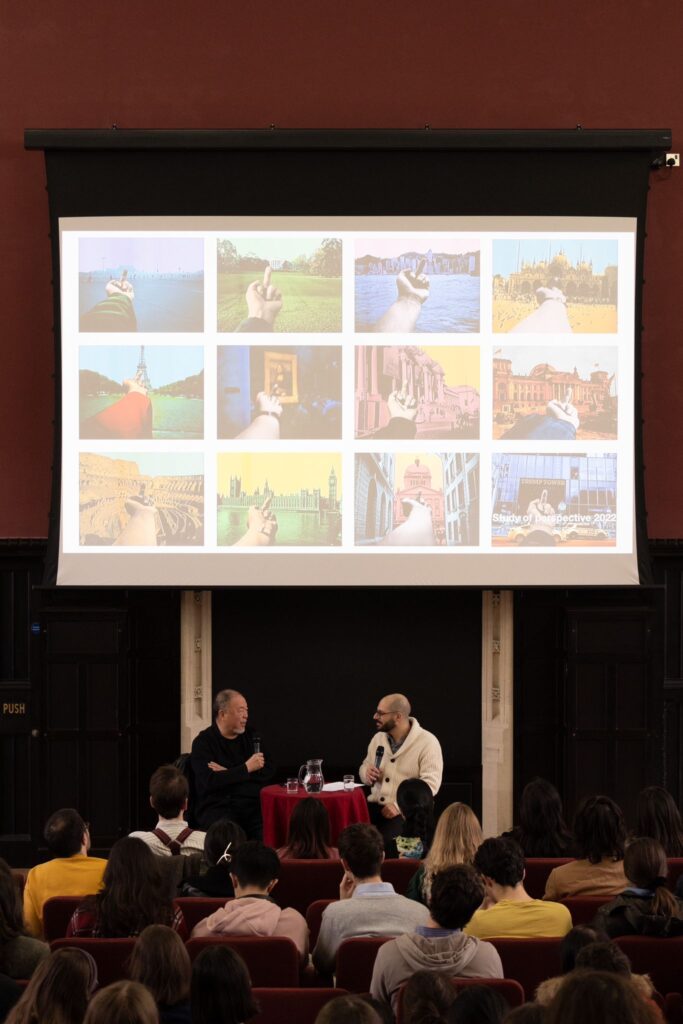Written by Dr Michelle Darlington, Cambridge Centre for Social Innovation, and Dr Beatriz Acevedo, Anglia Ruskin University. Photography by Eliana Dyer-Fernandes.
What is the role of art in social change?
This is the core question of the ‘Social Canvas Projects’, a new social enterprise founded by Spencer Lee Boya, a student on the MSt in Entrepreneurship at Cambridge Judge Business School.
Spencer recently participated in Cambridge Social Ventures’ three-day social venture residential in collaboration with the King’s Entrepreneurship Lab and Mastercard Foundation, where he developed his business plan for the Social Canvas Projects. Its mission is to reimagine the power of the creative arts in driving social change, through interdisciplinary project-based collaborations. The aim is to run the events in universities to inspire more individuals to dedicate their artistic practices to delivering social impact.
To explore how collaborative creativity can drive social change, Spencer partnered with The Fitzwilliam Museum Society – the largest student society dedicated to the arts in Cambridge – to invite one of the most interesting artists of our time, Ai Weiwei. The Chinese contemporary artist spoke at St John’s College on the17 January, in conversation with Dr Kareem Estefan, Assistant Professor of Film and Screen Studies at the University of Cambridge.
Artist, activist, and entrepreneur
Ai Weiwei has been described as an activist and entrepreneur whose work is transformative beyond the economic. It enriches “social condition by creating possibility” (Hjorth and Holt 2016, p.50-51). In her doctoral thesis, Executive Director of the Cambridge Centre for Social Innovation, Nicole Helwig, describes his example as shining a light on “what social enterprise could be – a marriage of entrepreneurship, artistic creativity, vision, purpose and activism.”
Ai Weiwei’s “in conversation” at St John’s College, covered different topics from the role of art in social activism, to the potential and challenges posed by Artificial Intelligence; and this extensive work on the human condition and freedom of speech. Amongst other things, Ai Weiwei spoke about the influence of his father on his artistic practice. He was born during the Chinese Cultural Revolution, the year his father was sent to exile for his poetry. His father lost his voice, but Ai Weiwei built his career by finding ways to have a voice. He says, “Everything is an art, everything is politics.”
His work asks difficult questions; for example his installation ‘Straight’ (2008-2012) shows how art has a role in asking questions and questioning political issues. As presented in his retrospective at the Royal Academy in 2015, “Straight” was a room filled with iron bars recovered from the 2008 Sichuan earthquake. It is said that the poor quality of building materials caused much of the tragedy and increased the death toll. Iron left from the rubble was resold and only unsalable twisted bars were left. Ai Weiwei and his team collected these and straightened them by hand, hammering each one to its original shape. It was a physical act of straightening – putting things right (Acevedo, 2015).
Alongside the straightened bars, Ai Weiwei listed the names of 5912 of those killed by the earthquake. This was a political act because those killed had not been named or counted. He posted on his blog information about the dead, collected by a group of volunteers. He started asking questions: “How many people died? Who is accountable? What is the value of human lives?” With this work, he said, “Every day we put the state on trial.”
His questions and dissenting comments landed him in trouble. His freedom of speech was curtailed; a number of his shows were canceled, he was arrested for alleged tax evasion, and his passport was retained by the Chinese government for four years. After this, he moved to Berlin, where he set up a studio.
He asks, “how can we ask the right questions in the context of the challenges we face today?”
Asking good questions is an art
Ai Weiwei says: “Art is a social practice that helps people seek their truth. I have to continue seeking my truth.” “If we don’t have freedom of speech, at least we still have the freedom of asking questions.”
Ai Weiwei noted that after WW2 art changed its position: movements like Dada and Surrealism questioned truth and reality and, therefore, he called for us to reconsider how art can function today, given the multiple injustices and global challenges we are witnessing. He noted the “harsh conditions” against freedom of speech globally, saying he did not expect this in the West.
He added that we can have the illusion of freedom of speech, but actually, much of what is being said is irrelevant. Despite having been censored in many countries, Ai Weiwei continues exercising his right to ask questions and enquire about the changing nature of “freedom of speech”. He says, “I don’t measure my speech by whether there will be consequences. I still believe in that.”
Audience members were interested to understand more about his views on new technology, and how it’s changing the landscape of knowledge and creativity. Ai Weiwei says, “The Internet has been essential. It liberated human expression”. But this leaves the question, what do you want to express? Although he upheld the importance of the Internet as an open forum, the discussion explored issues regarding the ownership structures of social media platforms and the role of AI in information-seeking and creative expression.
We asked what he felt to be the role of the University in free speech, and he responded that the University plays an essential role in allowing the possibility of asking questions. The University is a space of freedom that can contain multiple viewpoints, and we must defend that.
Asked if he had hope for the future he said no. He only tries to cope with his situation but he has to keep going. This is an invitation for us to keep going.
So, what is the role of art in social change? For Ai Weiwei, asking good questions is an art.
Social Canvas Projects and the Fitzwilliam Museum Society, 14 March 2024
The next event held by the Social Canvas Projects and the Fitzwilliam Museum Society will take place on the 14 March at the Fitzwilliam Museum. The event will act as a response to the main William Blake exhibition and explore themes such as the regenerative and destructive power of art in an era of war, revolution and political turbulence. The event will feature a UK-wide student exhibition, original poetry, music performances, and a talk given by Holly Waddington, the Oscar-nominated costume designer from Poor Things.
References
Acevedo, B. 2015. Blog post Ai Wei Wei on Recycling, Twitter and Virtues on Art. https://beatrizacevedoart.wordpress.com/2015/10/18/ai-weiwei-on-recycling-twitter-and-virtues-in-art/ [Accessed 19/01/2024]
Helwig, N. (2024) From Ballet Studio to Business School: Dancing in the Social Enterprise In-Betweens, Doctoral Dissertation. Middlesex University.
Hjorth, D. and Holt, R. (2016) ‘Social condition by creating possibility’, in Entrepreneurship and the Creative Economy: Process, Practice and Policy. London: Routledge, pp. 50-51.





SEI
Wow, this was a fascinating read! The blend of art, activism, and questioning really struck a chord with me, especially how Ai Weiwei uses his art to provoke thought and inspire change. The idea that art can be a powerful tool for social change isn’t new, but seeing it in action through initiatives like the Social Canvas Projects brings a fresh perspective. I’m particularly intrigued by the upcoming event at the Fitzwilliam Museum that aims to explore the impact of art in times of turmoil. It’s refreshing to see art not just as a form of expression but as a means to engage with and question the world around us. Plus, the involvement of figures like Ai Weiwei and Holly Waddington adds a layer of depth to the conversation. Can’t wait to see what comes out of the March event! Keep up the great work, and thanks for sharing this inspiring journey.